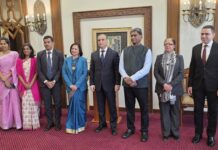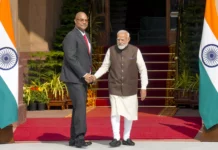 NEW DELHI: India feels its good relations with the US and Iran has placed itself in a “significant position” to bridge the gap needed for a meaningful dialogue between the two countries, at loggerheads over Tehran’s nuclear program.
NEW DELHI: India feels its good relations with the US and Iran has placed itself in a “significant position” to bridge the gap needed for a meaningful dialogue between the two countries, at loggerheads over Tehran’s nuclear program.
External Affairs Minister Salman Khurshid admitted that Iran felt “disappointed” over India voting against it at the United Nations but expressed happiness over the fact that both countries are able to continue their relationship and count on each other as “good friends”.
Addressing an international conference on Iran here organized by the Global India Foundation, he took pains to explain how India did not accept the “unilateral sanctions” slapped by the US on Iran and went ahead with its regular engagement with the oil-rich nation.
Khurshid said India sent a message to the world that it was not taking sides against Iran but was only taking a principled position and that despite sanctions “we would be there to be counted as a friend.”
Talking about India’s relations with the US, he said the ties between the two countries have evolved into a “very valuable relationship” over the last 15 years.
“We remain good friends with the US and we are extremely good friends with Iran and therefore it places us in a very significant position to be able to bridge the gaps and to provide the linkages that are necessary for a meaningful dialogue,” he said.
“We did not accept unilateral sanctions imposed by the US on Iran. We can disagree and the world now recognizes our ability to agree and disagree,” he said. Khurshid said India has remained “good friends” with Iran in a substantive way despite the fact that it could not stand by that country in critical moments when it came to voting in the United Nations.
“I know they would be disappointed, anyone is disappointed if you can’t get someone to stand by you in moments which are critical. But the important thing is we were able to continue talking with Iran and Iran understood why we were doing and what we were doing,” he said.
Khurshid said India stands at the forefront of candidates who are seen in a position to give Iran the kind of comfort, advice and handholding that would be needed in the “very very critical and crucial discussions and dialogue that Iran needs to do.”
“India had to take positions and obviously not necessarily align themselves with the aspirations or at least perceived aspirations of Iran in recent times and the good thing is and the good news is Iran has understood this,” he said.
The Minister also rued that the public at large is not willing to engage themselves in discussing the country’s foreign policy and stressed the fact engagement of ordinary citizen with the world has reduced.
He also said the India-Iran Joint Commission meeting would be held in a “few weeks” here and issues relating to enhancing of trade and the currency involved in trade would be taken up for discussion.
On India’s stake in Chabahar in Iran, he said the country would need corridors and passages to reach Afghanistan in its efforts to rebuild the war-torn country after the US-led NATO troops leave by 2014.
India’s interest in the Iranian port is to get a direct access to Central Asia with Iran planning to expand the port in five phases and to ramp up its capacity to 20 million tonnes by 2020. -PTI






